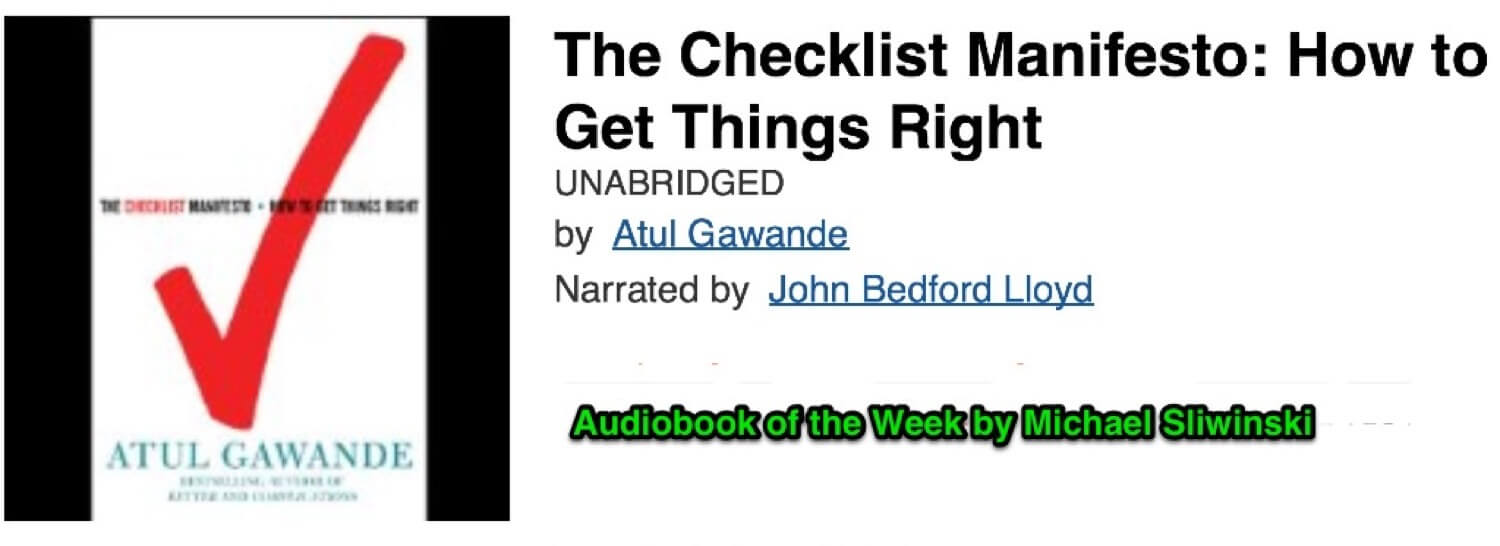The Checklist Manifesto by Atul Gawande - (audio)book of the week
📖Books
Several people recommended me this book and finally I gave it a listen and it totally changed the way I think about work right now. It’s written by a surgeon who cuts people for a living (saving their lives in the process) and lives and breathes by checklists before and after each surgery. He claims that “checklists” literally save lives. Really?

A morning in a day of a parent of a 4-year old
I’ve got a personal story related to this book. The other morning I woke up, did some work, at 8:15 a.m. woke up my baby girl. It was pretty late already. I quickly helped her dress up. We went downstairs, she put on a jacket, it was getting late, we rushed to the garage, I almost forgot her bag, we took off in my car…
After a short 10 minute drive we stopped at the front entrance of the kindergarten at exactly 8:55 a.m. - perfect timing (I thought). Proudly, I got out, opened her door… and saw she had her slippers on!
Checklists might be boring… but they make sure we don’t forget stuff
It seems ridiculous to think I’d need a checklist for our “morning routine” but that day I woke my baby up a little too late (15 minutes!) as I was too immersed in my morning work. And when you’re rushing, the checklist really helps.
Airplanes have checklists for everything
Apparently the pilots of airplanes have checklists for everything. Each maneuver is described by a checklist and in the moment of stress or engine problem, the pilots check their checklists to make sure nothing is missing.
Surgeons have checklists, too
According to the author, even the hospitals who specialize in the same kind of operations make mistakes. And they make less of them if they run checklists. And the author has studies to prove it. Here are some benefits of the checklists:
- Less forgetting - if you go through a checklist, nothing is forgotten… and you don’t have to remember about every detail of an operation or project. The checklist reminds you. This is very GTD - less on your mind, more in your trusted system.
- More collaborating - in hospitals, when the checklist was read aloud, people felt they work together, they are on the same page, everyone could speak up and say they checked something off, the team was working better.
- More focus - even the smartest people need checklists… and when they use them, they focus more on their skills in getting the tasks done and don’t have their mind reminding them about what could or could not be next.
- More clarity - it’s on the list. It’s broken down into pieces. It’s clear what needs to be done. Less room for error.
Why we need checklists in our everyday life?
I might not really need a checklist for morning routine… as this “slippers” incident only happened to me once… but I might need checklists for all the other things.
This is why I finally gave in and introduced two new features to Nozbe that support checklists (warning, product placement here :-)
- Checklists in tasks - you can add a comment to a task in the form of a checklist. It’s hugely useful, you can communicate better what needs to be done in that particular task. I use it very often with my team.
- Project templates - you can save a project “for later” as a template and once you’ve completed it and need a new, similar one, just create it from the template. Lots of people who do repetitive, similar projects (hiring people, getting clients, signing authors) use it every day.
How I use checklists in my iPad-only journey
When I moved to the iPad I’ve designed many work-flows that help me define my work. Something I haven’t bothered to do on my “big computer”. Thanks to this I have processes for writing blog posts, doing different kinds of feedback to my team, processing email, etc…
Checklists are very huge in team environment
My team is growing and I want to achieve amazing things with Nozbe this year so I’m designing many checklists for my team. Helps me structure everything out and make sure we’re all on the same page.
I think I have to re-read the “Checklist Manifesto” again (I read it a few months ago but a recent comment on Twitter about checklists brought me back to this book, hence the post).
Question: Do you use checklists? Where? When? Do they help? How? Have you read this book? Why not?